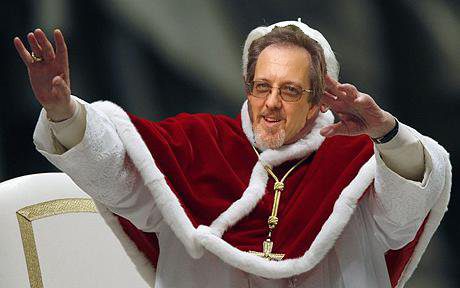
I wrote twelve critiques of the book entitled, Roman but Not Catholic: What Remains at Stake 500 Years after the Reformation, by evangelical Protestant (Wesleyan) theologian and historian Kenneth J. Collins and Anglican philosopher Jerry L. Walls (Grand Rapids, Michigan: Baker Academic, 2017). The complete list can be found on my Calvinism and General Protestantism web page (scroll about halfway down).
Then I wrote a review of the book on its Amazon page. Geoffrey S. Robinson wrote a fairly lengthy critique of my review, which can be read underneath it. This is my reply to most of it. His words will be in blue.
***
[T]he proper context for interpreting Newman must be considered. He was well aware of the theological method known as maximalism which was developed by Duns Scotus. From the book: “it was better to falsely attribute an honor to Mary than to possibly take a real one away.” (pg. 303)
*
This move encourages broad and general applications typical of Newman in this area. Second, it was Jaroslav Pelikan himself who referred to the “methodology of amplification,” that often played out in Mariological contexts. (RNC p. 318) “Once Mary was deemed by her devotees to be ‘higher than the cherubim, more glorious than the seraphim,’ and ‘to be regarded as not unworthy of any of the honors and privileges that had, according to the Scriptures of both the Old and New Testament, been conferred on others’. (pg. 318)
To prove that Cardinal Newman believed these ridiculous things would be easy enough: simply produce straightforward documentation that he said that Mary was to be worshiped, was the image of the Father, or could or should be called “God” or “Creator.” There is a website called Newman Reader that has all of his works, and it can be quickly searched. Good luck! But these contentions in the book are without question, patently absurd. Newman was describing what Arians said about Jesus and making a qualified partial analogy. He did not apply these attributes to Mary at all in this passage. These contentions alone are enough to discredit the authors (and you, as well).
Peter Sean Bradley has also thoroughly debunked this nonsense by using an argument from immediate context. Apparently I can’t give URLs here (I couldn’t in the review), which is a shame, but it is found on Jerry Walls’ Facebook page, on a thread entitled, “Newman’s Arian Marian Piety” (10-18-17).
Moreover, the same Jaroslav Pelikan that the authors and you cite, had an infinitely higher regard for Cardinal Newman than Collins does. Thus, in his 1988 work, The Melody of Theology, in the article on Newman, he opined that the Essay on Development was “the seminal work for the thought of theologians and historians –and, above all, of historians of theology” (p. 181; my italics). This is the judgment of a scholar who produced a famous five-volume history of the development doctrine (which I also own). Dr. Pelikan goes beyond that, into almost rapturous praise:
Not only to his latter-day disciples, therefore, but to many of those who have drawn other conclusions from his insights, John Henry Newman has become the most important theological thinker of modern times. (Melody, p. 181; my italics).
I wrote in my first critique of the book:
But Collins would have readers think that such an eminent Churchman and dazzling writer as Newman (even in the estimation of a then-Lutheran scholar like Pelikan, and, if he is right, many others, too, including many non-Catholics), was foolish enough to argue that Mary should be called “God” and “Creator” and “the Image of the Father.” It’s not even remotely plausible, and it is untrue as a matter of fact.
[Queen Mother / Queen of Heaven] Are you referring to Catholic apologist use of Solomon getting a request of the Queen Mother but ignoring that Solomon denies that request and then kills the person who the Queen Mother was interceding for?
Your comment about “Queen Mother” is a common contra-Catholic chestnut. Catholic apologist Steve Ray refuted it as follows:
The Queen Mothers of earthly kings of Judah were not always good examples or godly queens. Many of them were egregious sinners and would intercede for the people with improper requests to the king. But, this takes nothing away from the fact that the mother was the queen and intercessor. It only confirms that many of the Old Testament kings and queens were disobedient to God.
I would add that God knew from eternity that King David wold commit adultery and kill a man to obtain his wife. Yet that didn’t stop God from calling David a “man after his own heart”, from making an eternal covenant with him, and for directing the biblical writers to depict him as a prototype of the Messiah, Jesus. The “sin argument” never proves very much. Steve Ray answered this at greater length in another 30-page paper of his on the topic:
Now our naysayer comes up with the same tired old argument I heard as a child. He says “she did not obtain from her son what she wished” as if that proved there could not be a Queen Mother. I remember my dad telling me that Mary could not be the queen of heaven—using the same argument—because Bathsheba did not get the request she asked for. I guess my question to that is “So what, what does that prove?”
Solomon was a type of Christ even though he was a sinner. Bathsheba was also a sinner. She asked for something unwise and Solomon refused. Just because Bathsheba asked for something unwise and it was not granted to her by her son Solomon, it does not mean she didn’t have the office of Queen Mother. It simply means she was unwise and didn’t receive her request. . . .
But didn’t Solomon reject his mother’s request? Yes, he did. But that in no way detracts from the fact that this office existed anymore than the presence of false prophets proves that prophets did not exist. It should be noted that all three parties, Adonijah (v. 17), Bathsheba (v. 18), and Solomon (v. 20), believed that because Bathsheba was the Queen Mother that she could intercede on others’ behalf with the reasonable expectation of a favorable answer. No one’s sensibilities are shocked by Bathsheba’s actions. The negative answer does not invalidate the fact that Bathsheba could ask and that there was an expectation that whatever was asked would receive a favorable hearing. . . . whether or not office holders are sinners is irrelevant to whether an office exists. Indeed, an evil office holder may lower the prestige of an office, but it doesn’t invalid[ate] it any more than a bad president proves that the office of president doesn’t exist. We’ve seen that in our lifetime, unfortunately.
[see my critique #2: “Queen of Heaven” and critique #6, “Assumption, Queen Redux”]
“For almsgiving saves from death and purges away every sin. Those who give alms will enjoy a full life,”- Tobit 12:9
Tobit 12:9 is rather straightforward. Ephesians 2:8-10 excludes works from salvation as well and that is rather straightforward. The clear should interpret the unclear. Jesus tells the Rich Young Ruler to sell all he owns and follow Him. Jesus was essentially telling this poor soul, deluded by works righteousness thinking but still troubled, to repent of his money idolatry and follow (believe) in Jesus. Repent and believe. He was showing the Rich Young Ruler “no, you haven’t even begun to keep the 1st commandment like you think. You have an idol.” Going from this to “giving to the poor expiates sin” is eisegesis. And in the final judgement, Protestants agree that there is a judgement according to works. Works as evidence that you are a sheep. Helping the poor does turn a goat into a sheep. They give evidence. Again, this is a failure of eisegesis.
If we have a clear passage in Ephesians and a clear passage in Tobit and they conflict, Tobit needs to be jettisoned. They both cannot stand together.
[see my full treatment of this in critique #8: “Heretical Tobit? (Alms & Salvation)” and also critique #12: “Salvation (Soteriology)”]
The whole issue of faith and works and how they relate to justification and sanctification is a huge and extremely complex one, and I can’t possibly adequately reply to your comments here (especially without URLs). Readers who want to know my [orthodox Catholic] position, and abundant scriptural support for it, may search my name on Google, go to my Patheos blog, and look for the web page about Salvation and Justification.
But as one example: you trot out Ephesians 2:8-10 (as Protestants always do). I have a paper about 50 Bible passages regarding the Last Judgment. In all of these, works are central in the equation. Not one asserts faith alone (sola fide) as the quintessential requirement for salvation. One mentions being “faithless” as a disqualifier for salvation, but it also discusses works, so it’s not asserting faith alone as the way to be saved. The Bible mentions “faith alone” (at least in RSV) only one time: “You see that a man is justified by works and not by faith alone” (James 2:24).
I need a reference that Jerome came to accept the Apocrypha as canonical (in the proper sense of the word). Cajetan, opponent and contemporary of Luther, references Jerome for not believing the Apocrypha is canonical. I’ve searched high and low for this reference. I have found a Catholic discussion board where the Catholic looking for this reference is told by another Catholic that no, Jerome didn’t believe in the Apocrypha. I have read all of Roger Beckwith’s Old Testament Canon of the New Testament Church and I don’t remember such a reference. But if you can find a primary source for this, please do.
I didn’t claim that St. Jerome “came to accept the Apocrypha as canonical.” To the contrary, I said in my review (that you quote; italics added presently): “Jerome is the strongest case against it” but also that “even he accepted several of these books as scriptural, in various utterances.” In order to refute my claim (rather than your straw man), you would have to demonstrate that he did not say what he did about various books, that I documented in my blog post regarding the deuterocanon (one of twelve in reply to Walls and Collins). My review was only a quick summary of a few of the arguments I made in nine of those posts.
***













